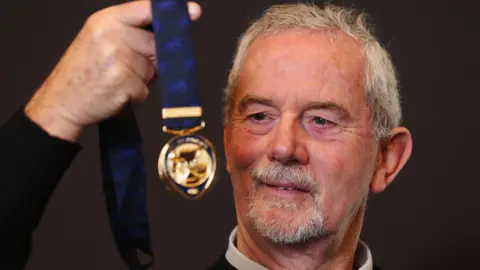The Australian sports community is mourning the loss of one of its iconic legends, Robert Walls, who passed away at the age of 74. His death marks a significant moment not just for the Australian Football League (AFL) but also for the ongoing discussions regarding voluntary assisted dying laws within the country. Walls utilized these laws in the wake of a devastating terminal illness; he had been diagnosed with acute lymphoblastic leukaemia, a rare and aggressive form of blood cancer, just last year in 2023.
Walls was a celebrated figure primarily known for his extensive contributions to the Carlton Football Club, as well as his career beyond playing, which included roles as a coach and media pundit. He was instrumental in securing three premiership titles for the club during his playing days and added another championship as a coach. In addition to his triumphs on the field, Walls left a significant mark in sports media, transitioning seamlessly from the field to the commentary box where he continued to engage fans and followers of the game.
On the morning of his passing, Walls was surrounded by his family in his apartment, which holds sentimental value as it overlooks the historic Melbourne Cricket Ground—the spiritual home of the AFL in Victoria. The comforts of family and the familiar sights of his beloved sport were key aspects of his farewell, highlighting the deep connections he fostered throughout his life.
Victoria’s voluntary assisted dying laws, which were introduced in 2019, provide a legal framework for individuals diagnosed with terminal illnesses to choose to end their lives through medically supervised means, following the approval of two doctors. This legislation represents a pivotal change in Australian healthcare policy, reflecting a shift toward respecting individual autonomy in end-of-life choices. Robert Walls decided to take control of his final moments, a decision that resonates with many facing similar medical battles.
According to a statement from his family, Walls battled cancer for over two years, enduring more than 250 nights in hospitals. His family expressed a sentiment of pride regarding his strength and the grace with which he approached his final days, noting that he “chose to end a fight that had been long and arduous.” They emphasized his lifelong passion for football, describing Walls as a “self-proclaimed fan” who dedicated over three decades to the game in various capacities—14 years as a player, 16 years as a coach, and 25 years as a commentator.
In tribute to his legacy, Carlton Football Club released an ardent message honoring him as “one of our game’s great servants,” underscoring the impact he made during his extensive career in Australian football. Over the course of his time with Carlton, Walls played more than 200 matches and clinched premierships in 1968, 1970, and 1972—milestones that forever etched his name into the annals of club history. His coaching tenure was equally fruitful, including a premiership win for Carlton in 1987, alongside his guidance of other teams like the Brisbane Lions and Richmond Tigers before he retired in 1997.
Walls’ death comes nearly two decades after the loss of his wife, Erin, who passed away due to cancer in 2006. He is survived by three children and his partner, Julie, a testament to the family-oriented life he cherished, even amidst the trials of illness. The admiration for Robert Walls transcends beyond just his achievements on the field; it encompasses the compassion and character he brought to everything he was a part of, making his loss a deep one for family, friends, and fans alike.



